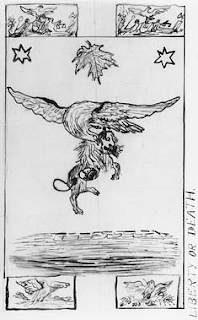In May of 1838, McLeod and other English-speaking rebel leaders set up a secret society of their own called the Hunters or Patriot Hunters. Grand lodges appeared in St. Albans, Vermont, Cleveland, Ohio (the western headquarters), and Rochester, New York, (the eastern headquarters).
Aside: Many sources suggest the lodge took its name from Dr. James Hunter (1790-1850), a Canadian Patriot who marched with William Lyon Mackenzie against Toronto. The similarity is a trite coincidence. The name came from Nelson's group, Frères-Chasseurs, which translates into hunter brothers or hunter brotherhood.
Membership in Hunters Soars Quickly
Fascination with the Hunters caught hold and spread through the border towns like fire in dry grass. New lodges opened weekly across the northeastern US. In Watertown, New York, Captain Daniel Heustis helped start a local Hunters lodge in May that quickly drew 1,900 members, including Bill Johnston. Johnston helped start other lodges in upstate New York.By the end of the summer, Hunters had set up hundreds of lodges. They ranged along the US border from Maine to Wisconsin and as far inland as Kentucky. At their height, the Hunters had in excess of 20,000 members. Some sources say membership reached 200,000, though 40,000 is probably a more realistic peak.
Hunters Sworn to Secrecy and Obedience
The Hunters Lodge held four degrees of membership: snowshoe, beaver, master hunter, and patriot hunter. New members started as snowshoes and worked their way up, learning new secret signs and passwords at each stage. May Hunters were also Freemasons already comfortable with secrecy and ritual.Each new member recited secret oaths on their knees blindfolded with a knife pointed at their throat. Betrayal of lodge secrets meant death. A member's house could be burned for disobeying orders.
Besides Donald McLeod, one of the key organizers and the man thought to have authored the Hunters oath was Dr. Charles Duncombe.
 |
| Hunters flag showing American eagle carrying away British lion |
Some Hunters Hoped to Annex Canada
While the Hunter leaders bragged they could send 25,000 armed men against the British in Canada, most members had little interest in war. Hunter membership became the best way to make economic and political connections in difficult times. A economic depression and ongoing banking crises gripped the US border states and united the diverse classes. Politicians, businessmen, mechanics, farmers, and common laborers signed up.For many, the Hunters movement was not an altruistic attempt to bless Canada with a republican government. Profiteers and carpetbaggers mixed with honest idealists. Many members flocked to the Hunters because its leaders promised free Canadian farmland once they liberated the British colonies. (That promise later proved to be a major obstacle to military success by the Hunters because it enflamed the Canadian militia, a defense force heavily populated by farmers.)
Among some American Hunters, the undeclared Patriot War provided an opportunity to complete unfinished business from the American Revolutionary War—to extend the US border northward just like the Texas revolution in 1836 let Americans annex Mexican territory.
Hunters Drain Other Rebel Groups
With the rise of the Hunters, Mackenzie's influence waned. He had no significant role and many members of his organizations, the Patriots and the Canadian Refugee Relief Association, joined the Hunters. The Hunters also stole members from the Sons of Liberty, a secret society started by General Henry S. Handy in Michigan.By the summer of 1838, the Hunters and the Frères-Chasseurs had united all the forces facing the Canadian colonies.
Further Reading
- The Patriot War of 1837–1838: Locofocoism With a Gun, by Andrew Bonthius, a look at the socio-economic conditions that spawned the Patriot War.

0 comments:
Post a Comment